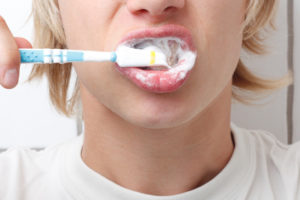 Preventive dentistry is the most effective and most important step you can take to keep your teeth healthy and prevent long-term damage or even tooth loss. This includes everyday, diligent oral hygiene as well as regular trips to see your dentist. Effective preventive dentistry keeps problems from developing and also helps make sure any problems that do occur are diagnosed before they become serious.
Preventive dentistry is the most effective and most important step you can take to keep your teeth healthy and prevent long-term damage or even tooth loss. This includes everyday, diligent oral hygiene as well as regular trips to see your dentist. Effective preventive dentistry keeps problems from developing and also helps make sure any problems that do occur are diagnosed before they become serious.
Your Role in Preventive Dentistry
Effective preventive dentistry begins with you. Your everyday oral hygiene routine is the most important step you can take in keeping your mouth and teeth healthy. The basics include:
- Regular brushing
- Regular flossing
- Regular visits to the dentist
- Avoiding activities that could damage the teeth
- Avoiding foods that could cause cavities
- Maintaining an overall nutritious diet
Brushing and flossing helps remove food particles that collect in the mouth as you eat. These food particles are consumed by the bacteria that naturally live in your mouth. Under normal conditions, these bacteria maintain a healthy balance. If they receive too much sugar, or if food particles are left in the mouth, they can multiply and create collections of waste products that cling to the surfaces of your teeth. This substance, called plaque, is highly acidic, and can eat through your tooth enamel, leading to cavities. If you brush and floss every day and avoid sugary or sticky foods, these bacteria are more likely to maintain that healthy balance.
Your Dentist and Preventive Dentistry
Your dentist helps prevent dental health problems by providing more extensive cleaning, fluoride treatments, and a close examination of the condition of your teeth and gums. Since many issues with the teeth produce few symptoms until they become serious, your dentist is an important resource. Using digital imagery, X-rays, and routine examination, your dentist can find cavities while they are still very small and treatable.
Your dentist also evaluates the health of your gums to be sure you aren’t developing any early signs of gum disease—another condition that is much easier to treat when it’s diagnosed in early stages. These regular visits, combined with your everyday care, form the framework for effective preventive dentistry.
Contact our team at the office of Dr. Theodore Sewitch today!

